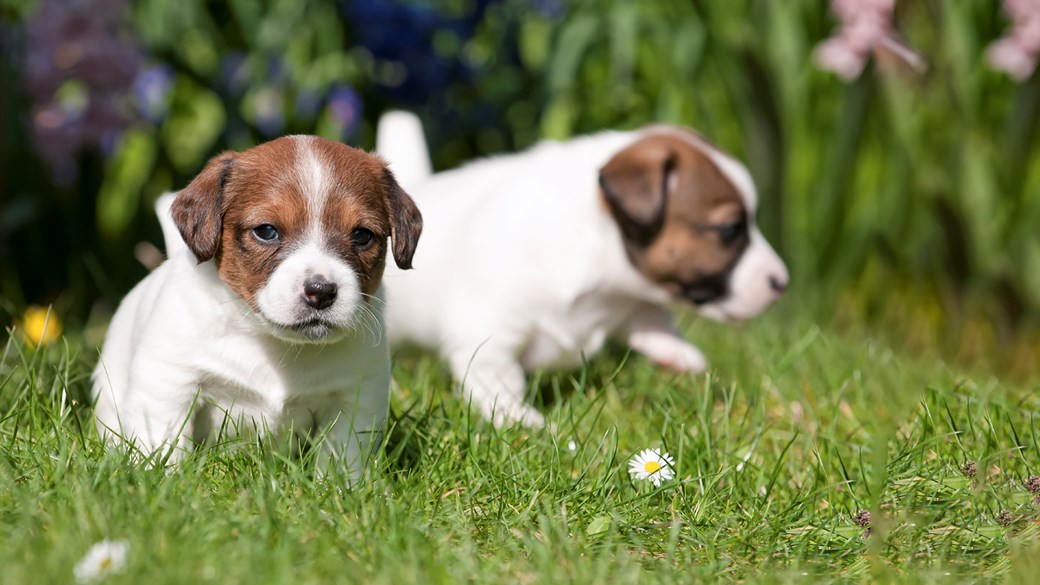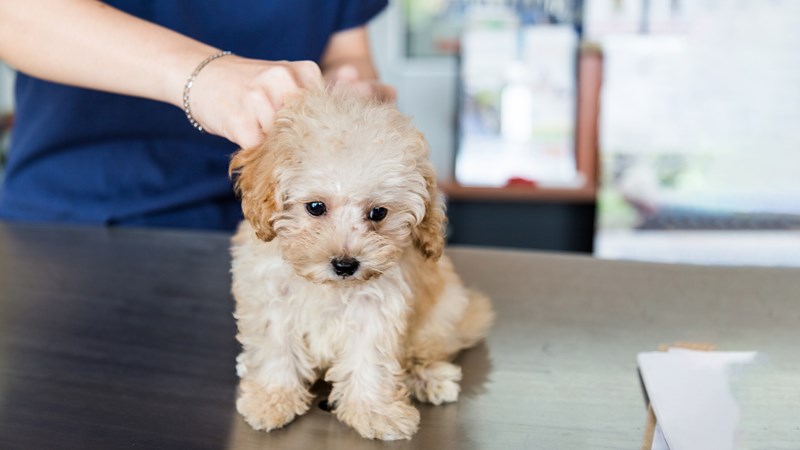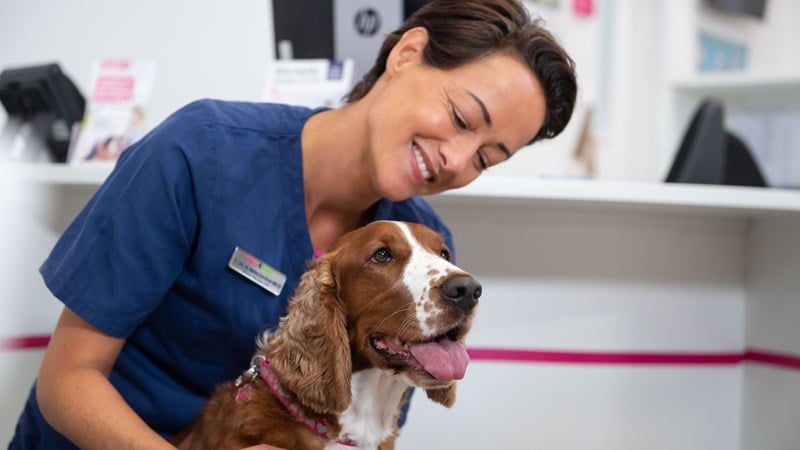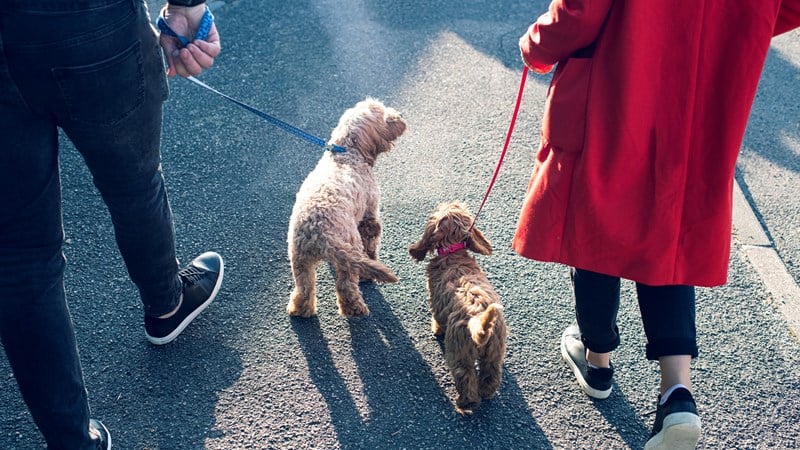
The Puppy Socialisation Period
Check out our top tips for trouble-free puppy socialisation.
A well-socialised puppy will find it easier to navigate life. You’ll be able to take them
confidently along with you, knowing that they can cope with situations.
Read about how to help puppies who have missed out on socialisation during lockdown here.
Other people find well-socialised puppies a pleasure to be around.
We’ve all met dogs who bark and lunge when they see other dogs, or who are fearful
around certain people. Often, it could be easy to assume that they’ve had a bad experience or been hurt in the past. That’s not always the case, however. Simply having had no experience of being around children or other dogs, for instance, can be enough for some dogs to turn to fearful or aggressive displays because they are trying to keep themselves safe from a situation they never learned was safe.
Puppies are all different – some are naturally brave little characters while others are more timid. Whatever your puppy’s temperament, investing some time in socialising them while they’re young will equip them with skills for life and enable them to cope with most situations they may meet.
So, what is socialisation and why is it so important?
When puppies are very young, they need to learn which situations are safe and which ones could be risky for them. From about the first three weeks to three months of life, they go through what’s known as their ‘socialisation period’. They learn to accept all the sights and sounds of normal life so that when they meet those situations later on, they can relax, knowing they’re safe.
They also need to know when they could be in danger and what to do about it. At around eight to 11 weeks old and again at around six months, puppies have short periods of what is called neophobia. This means, ‘fear of new things’ and it plays a big part in how puppies and dogs keep themselves safe. Negative experiences during these periods can have a particularly big impact on a puppy’s view of the world.
It’s really important to provide a wide range of positive experiences for your puppy for at least their first year of life. But what sort of experiences are we talking about and how do we present those to the puppy and let them know they’re safe?
We take a lot of things for granted with our dogs, such as behaving calmly around different people or dogs, travelling in a car without seeming anxious or excited, even walking in puddles or crossing foot bridges. These are all situations many dogs could find tricky if they haven’t learned about them while they were puppies.
You might come across situations with your dog that you could never have practiced during their early months, but if you’ve equipped them to deal with lots of other sights and sounds, they’re more likely to accept this experience too.
Read more about puppy socialisation
If you were to sit down for five minutes and make a list of every type of place you might go, every sort of person, animal or vehicle you may see, every weather you might go out in, or surface you might walk on, or appliance you may use in the home or garden, you’ll probably end up with a big list! You know all of these experiences are safe, but your puppy doesn’t naturally know this.
There are lots of socialisation opportunities, both inside of your home and out. It’s really important not to wait until your puppy’s primary vaccination course is complete before you begin the process, but this doesn’t mean taking risks.
Young puppies can be carried in your arms when you go on the school run, or when you walk to the local shop. You can even carry them on what will become your walks in the future. If they’re too heavy to carry in your arms, you can use a carrier that resembles a backpack or baby sling.
Within your home, your puppy can be exposed gently to the sounds of appliances like the washing machine, TV and vacuum.
You can take them out in the garden (keep them on a lead and harness unless your garden is fenced securely) in all weathers so that they don’t grow up worried about going out to the toilet in the rain.
Puppies need to meet people of all ages and appearances. People wearing hats, facemasks, glasses, even motorcycle helmets are all great opportunities to ‘tick that box’.
Puppies need to feel confident around children of all ages even if you don’t have children in your family, because they will meet children while you’re out and about.
When introducing your puppy to people, there are a few important things to remember:
- Give the person meeting your puppy a few tasty treats to offer to your puppy. Ask the person not to put their hand over the top of the puppy’s head, as this isn’t an easy place for the puppy to see and can be frightening. Instead, ask them to hold the treat under the puppy’s nose and allow the puppy to sniff their hand. If the puppy is happy to take the treat and to sniff, then it’s okay for the person to give a gentle stroke on the puppy’s chest or shoulder after a couple of treats.
- Be careful to protect your puppy from people who really love dogs but who may not recognise that your puppy is feeling overwhelmed by them. Especially when puppies are on the ground, it can be frightening if people bend over the top of them to stroke them, or crouch down facing them. Instead, suggest they crouch sideways on and allow the puppy to come and inspect them. They can then offer a treat and perhaps a little stroke on the puppy’s chest, shoulders or back.
- Eye contact can be scary for dogs, so watch out for people putting their faces down close to your puppy. It’s great for them to look at and smile at your puppy but for short times and at a distance. This way, your puppy will learn that people giving them eye contact aren’t a threat.
- Children must be supervised closely when meeting puppies. Unless children are used to being around puppies, they can be quite scary. They have higher-pitched and often loud voices, they have relatively big eyes and their faces are often closer to the puppy and they can move quickly and suddenly. Very small children often need to grab things in their fists, which can surprise or hurt a puppy. Puppies often find children exciting, too, and may scratch or nip a child in play. A couple of ways to manage safe introductions are to carry the puppy so that you can provide a bit of distance between them and interested hands and faces, and so that you can physically remove the puppy from interactions if they begin to get overwhelmed; or, with children who are used to dogs, have both children and puppy sitting on the floor and allow the puppy to come and inspect the children. When they do, the children can be handed small treats to offer the puppy.
- Keep interactions with new people short and sweet so that your puppy doesn’t get tired or over-faced, or too full of treats! If your puppy is showing signs of becoming worried or over-excited, which may be shown as struggling in your arms when people approach and trying to look or move away, or getting very nippy, it’s time to remove them from the situation and let them calm down again.
It’s vital that your puppy can get on with other dogs if you want to be able to take them out in public and not feel anxious or embarrassed about their behaviour. If your puppy was raised in a normal dog family, with a mum and littermates, or perhaps even an extended dog family present, they will already understand that they’re a dog and have some skills in playing and responding to dog body language.
This ability to understand other dogs and to feel comfortable around them often gets interrupted when puppies come to their new home and their family keeps them isolated until their vaccinations have been completed. It makes it even more tricky that this normally corresponds with the most important time of their socialisation period.
In fact, it’s beneficial for new puppies to continue to meet and interact with dogs when they come to their new home. If you have other dogs in your home and they’re vaccinated, healthy and, importantly, kind with other dogs, your puppy can interact with them under supervision.
If you have family or friends with dogs who fit the same criteria, it’s fine for them to come for a play date in your garden or for your puppy to visit them in theirs, as long as it’s a private space where no unvaccinated or unknown dogs may have been.
Try to find opportunities for your puppy to meet dogs with different appearances and of different sizes. Some dogs do like to play rough though, so protect your pup from getting tumbled over by them by sitting or crouching with your pup looking out from between your knees so they feel safe and can’t get chased or hurt. Monitor the play closely and watch out for your puppy taking an interest in toys or treats belonging to other dogs, as they may get into trouble if an older dog is precious about their possessions.
If you don’t have opportunities to let your puppy play with other dogs at home, ask your vet practice whether they run puppy socialisation events, or can recommend trainers who do.
When it comes to meeting other dogs once your puppy is going out on a lead and properly fitted harness, take treats or a favourite toy along. Allow your puppy short interactions with other dogs who are on their leads – five seconds at a time if you’re passing on the pavement is enough time to want to be interested but usually not long enough for an older dog to decide they don’t want to talk to the puppy and show aggression towards them.
Reward your puppy for walking past other dogs calmly and always avoid dogs you know are loud on the lead or lunge at other dogs, as this can be frightening for a puppy.
You might not have other pets now, but it’s very useful to have let your puppy see cats and other family pets while they’re small. If you know anyone with a cat who’s used to living with dogs, find out whether you can take your puppy over to meet them. You don’t need to make this kind of introduction too formal – settling your puppy in your lap and offering them treats while the cat walks around or comes to have a look at them is a great opportunity.
Similarly, if you know anyone with rabbits or guinea pigs in a run and hutch, you can teach your puppy not to be excited around them. Teaching puppies impulse control – which means not reacting suddenly to things around them – is an excellent life skill. To teach impulse control, have your puppy on their lead and harness and allow them to see the other pet (this also applies around livestock and wildlife). Take along a supply of really high value treats and favourite toys. If your puppy knows ‘Sit’, have them sit in view of the pets.
Read our dog training tips here
Standing is fine if they haven’t learned to sit yet. Let your puppy know you have treats and keep the lead relatively short so that the puppy can’t rush and frighten the other animals but try not to influence them otherwise. The puppy will most likely be interested in the other animals and may even jump up to get a better look, but just stay quiet and still. The moment your puppy’s attention comes away from the other animals, give them a reward.
Repeat this a few times and your puppy should take less and less time before their attention turns away from the other animals and towards you and the treats. Try to find lots of opportunities to practice impulse control – it’s useful in so many situations – both exciting and scary. Eventually, your puppy will just get used to not rushing into exciting situations and look to you for guidance and confirmation that they’re doing the right thing.
Never let your puppy off among livestock – it can be dangerous for your puppy as well as for the other animals if your puppy grows up thinking they can have fun chasing them.
You may like your puppy to grow up into a dog who can accompany you in the car, or on trains or buses. Keep early journeys very short and provide a secure carrier or crate for your puppy.
When they’re very young, puppies will need to go to the toilet very frequently – as often as every 15 minutes if they’re active and playing – so keep in mind not to expect them to feel happy about a long train or bus journey to begin with. One stop or 10 minutes at a time is plenty.
If you’re hoping to take your puppy to social or sports events, then give the little taster experiences of these while you can still carry them. Protect them from too many hands wanting to stroke them if you go to places where there are a number of people. Everybody loves a puppy, but they may not realise that it can be overwhelming.
Sadly, many dogs and other animals, suffer from a fear or phobia of loud noises, such as
fireworks. This is often not noticed until it’s too late and it always gets worse. You can
search for and download free noise desensitisation programmes to run at home in the
background to teach your puppy that loud or sudden noises are nothing to worry about.
A final word on socialisation…
Be imaginative with your puppy’s experiences – sit outside shops, on park benches, within view of busy roads or schools. You don’t have to make every experience too formal. Things going on in the background while you play with your puppy (on a lead if out of your own garden) will gradually just become everyday sights and sounds and your puppy won’t ever remember a time they weren’t there.
If you’re finding your puppy seems to be reactive to new experiences or you think you’re struggling with socialisation, have a chat with your vet team before things get too tricky.
Continue looking for interesting socialisation opportunities until your puppy has at least passed their first birthday and you’ll set them up for life!
Puppy Podcast

Health Plans to keep your puppy healthy
At Vets4Pets we offer a range of Health Plans that make essential routine treatments more affordable. You'll save money on things like annual vaccinations, flea and worm treatment and routine health check-ups.

Join our free VIP Puppy club
Join the club for expert advice and tailored offers, including £30 off our Complete Care Health Plans

Puppy & Kitten Advice
Giving your pet the best start in life begins with getting the best expert advice.
